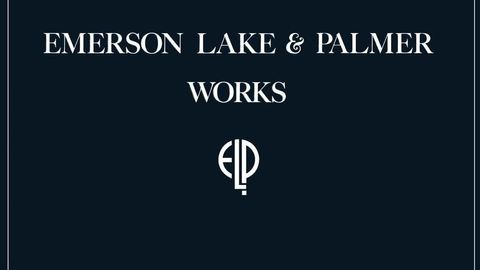Latest in the lavish reissues series, the relatively under-loved trio of Works 1 and 2 – plus the evergreen square peg Love Beach – is described as an ‘important’ phase of the group’s career. There’s little to argue with there, except perhaps the interpretation of the word ‘important’.
There’s a very good album in here somewhere…
Returning after a three-year hiatus off the back of the one-two high-spots of Brain Salad Surgery and Welcome Back…, expectations were high. No strangers to a critical shoeing – some writers chose to view Volume 1 as an implied threat – the allocation of one (vinyl) side to each member with the fourth containing a mere two tracks from the reunited trio, edged the chutzpah into the bracket marked ‘bold indeed’. Predictably patchy in terms of cohesion and quality, there’s a very good album in here somewhere, half-buried in layers of hubris and peacocking. Keith Emerson’s Piano Concerto No. 1 is a virtuosic, three-movement barnstormer, his interaction with the LPO nuanced and furious, while Greg Lake’s side veers close to well-crafted musical theatre, albeit short of anything truly memorable. Carl Palmer’s contributions, as rhythmically dextrous and technically dazzling as you’d expect, are so wildly disparate they’re hard to get a handle on. The extended version of Aaron Copland’s Fanfare… shines as brightly as the single edit, though equally illustrates the merits of a judicious trim, leaving the standout closer Pirates: compacting all the band’s flair and strengths into 13-and-a-half minutes of near-perfection, begging the question: why not earlier?
The same year’s (1977) Volume 2, though even more divergent than its predecessor, is by far the most interesting of the three. The psychotic jazz wig-out Bullfrog channels Mahavishnu Orchestra and The Mothers Of Invention, and Emerson’s arrangement of Scott Joplin’s Maple Leaf Rag, replete with orchestra, audaciously fuses ragtime with strings. A skeletal version of Lake’s seasonal smash I Believe In Father Christmas shows workings, and the addition of the Works Live set (Montreal, 1977) packs the remaining running time.
Which brings us to Love Beach. Heaped with derision on release, at least partly due to the palm tree/sunset-y yacht-rock sleeve (The Bee Gees meets Eddy Grant) and the title, not to mention an ill-advised reach towards the concurrent pop-ish conversions of Genesis and Yes, at least the incongruous shiny-synth stylings of the title track and career nadir The Gambler are leavened by the classic-era-informed Memoirs Of An Officer And A Gentleman. Of course, an alternative point of view could be it represents nothing less than another raised middle finger to the naysayers: a commendable trait which underpinned their entire career.


